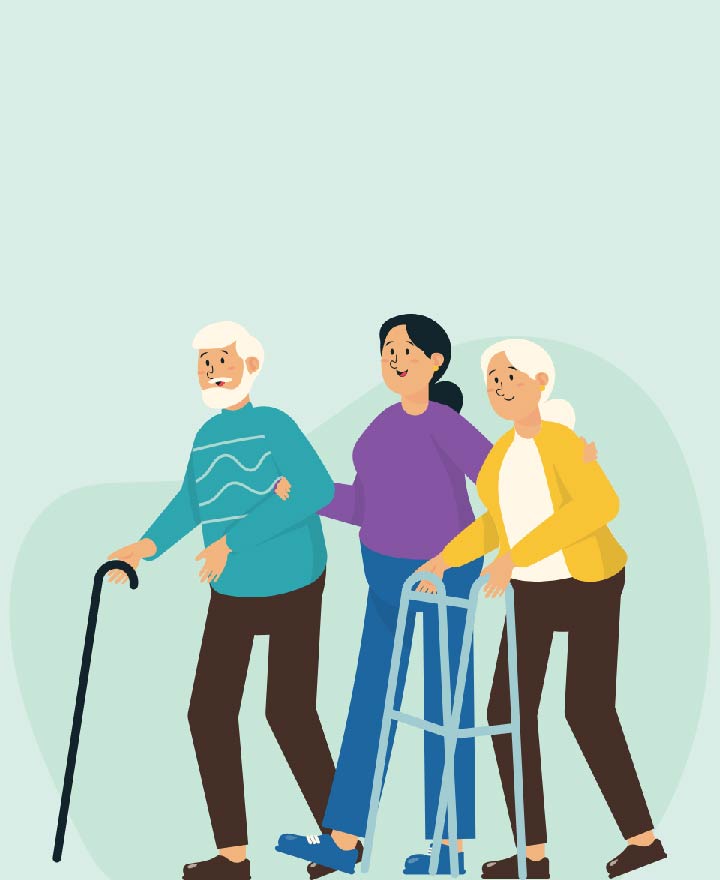

Common Causes for Limited Mobility in Senior Citizens
Mobility limitations are main reasons why elder adults seek care from members of the family or healthcare professionals. There could be a number of reasons behind this inability to move around, but some of the most common ones are underlined in this article. Read on to know more.
What is Limited Mobility?
Limited mobility refers to the inability to move on your own, or having to become dependent on others to do your basic, daily chores. These include simple tasks such as being able to walk to the restroom, dress, brush yourself, etc.
There are various degrees of limited mobility. While some people may only struggle to walk long distances, others may be unable to move their bodies.
Causes
Here are some of the common causes that lead to limited mobility:
● Arthritis
Arthritis is a degenerative disease that affects majority of the adult population of 60 and above, in some or the other form. This disease attacks the joints, causing pain and stiffness, thereby reducing mobility.
To improve the quality of life for seniors with arthritis, it is important to stay active as much as possible, keep a check on the weight and use the right medication to reduce the inflammation of the joints.
● Osteoporosis
This bone disease reduces bone density, which in turn makes the bones of the elderly susceptible to breaks and fractures. Many older adults with osteoporosis tend to make it worse for themselves by avoiding activity, fearing a fall or accident. This in turn leads to further weakening of the muscles that support the bones and joints due to the heightened inactivity.
● Neuromuscular issues
Neuromuscular conditions affect the nerves that control voluntary muscles, especially those in the legs. The weakening of these muscles is normally associated with multiple sclerosis (MS) or muscular dystrophy (MD) and other neuromuscular conditions that contribute to imbalance and instability in a person.
To improve the quality of life, regular physical activity and using devices that can assist with mobility are the possible solutions.
● Ear-related Imbalance
Mobility issues have been seen in many older adults due to issues with balance related to the inner ear. The most common balance disorders that affect the body parts are caused by peripheral vestibular dysfunctions as in Meniere’s disease. In such cases, balance can only be restored after proper diagnosis and treatment.
● Cognitive disorders
As a part of ageing process, adults may suffer from symptoms of dementia, like Alzheimer’s disease or Parkinson’s disease. This makes it harder for the individual to control their bodies, even for the basic everyday tasks.
● Cardiovascular conditions
Seniors living with heart ailments can have several issues with moving around because of their inability to walk even short distances without feeling dizzy or breathless. In such cases, quality of life can be improved by taking prescribed medication timely, and avoiding alcohol and smoking.
● Obesity
While obesity is a concern for all age groups, it is more of a concern for older age groups. This is because if senior citizens are over-weight, it puts more pressure on the musculoskeletal system which in turn causes pain and stress thereby affecting mobility. Secondly, obesity can also contribute to other issues like osteoarthritis and diabetes, which can further reduce mobility. To improve the quality of life, overweight adults should be encouraged to increase their physical activity, and change their dietary habits by consuming more and more vegetables, fruits and fish.
Conclusion
If an older adult believes they have mobility issues, they should seek professional advice. A medical practitioner will be able to rule out underlying causes for unsteadiness or dizzy spells and will be able to suggest exercises or aids to assist the person. A doctor may also recommend physical therapy or medication to address the symptoms.
One of the important components of our overall wellness is also being financially secured. Healthcare emergencies can happen any time, but a good health insurance policy can protect you from such uncertain situations. To know more about Wellness and other health related tips, visit the Wellness Corner.
Disclaimer: This blog provides general information and discussions about health and related subjects. The information and other content provided in this blog, website or in any linked materials are not intended and should not be considered, or used as a substitute for, medical advice, diagnosis or treatment. Kindly contact your Doctor before starting a new medicine or health regime.
Related Articles
How To Remain Healthy As You Age - Tips For A Healthy Lifestyle
6 Common Health Signs To Spot In Your Elderly Parents
You Are Never Too Old To Exercise
10 Power Foods That Help Seniors Build Strong Muscles
Walking Is The Best Exercise For Elderly
Published on September 28, 2022

















 Health Insurance
Health Insurance  Travel Insurance
Travel Insurance  Car Insurance
Car Insurance  Cyber Insurance
Cyber Insurance  Critical Illness Insurance
Critical Illness Insurance
 Pet Insurance
Pet Insurance
 Bike/Two Wheeler Insurance
Bike/Two Wheeler Insurance  Home Insurance
Home Insurance  Third Party Vehicle Ins.
Third Party Vehicle Ins.  Tractor Insurance
Tractor Insurance  Goods Carrying Vehicle Ins.
Goods Carrying Vehicle Ins.  Passenger Carrying Vehicle Ins.
Passenger Carrying Vehicle Ins.  Compulsory Personal Accident Insurance
Compulsory Personal Accident Insurance  Travel Insurance
Travel Insurance  Rural
Rural